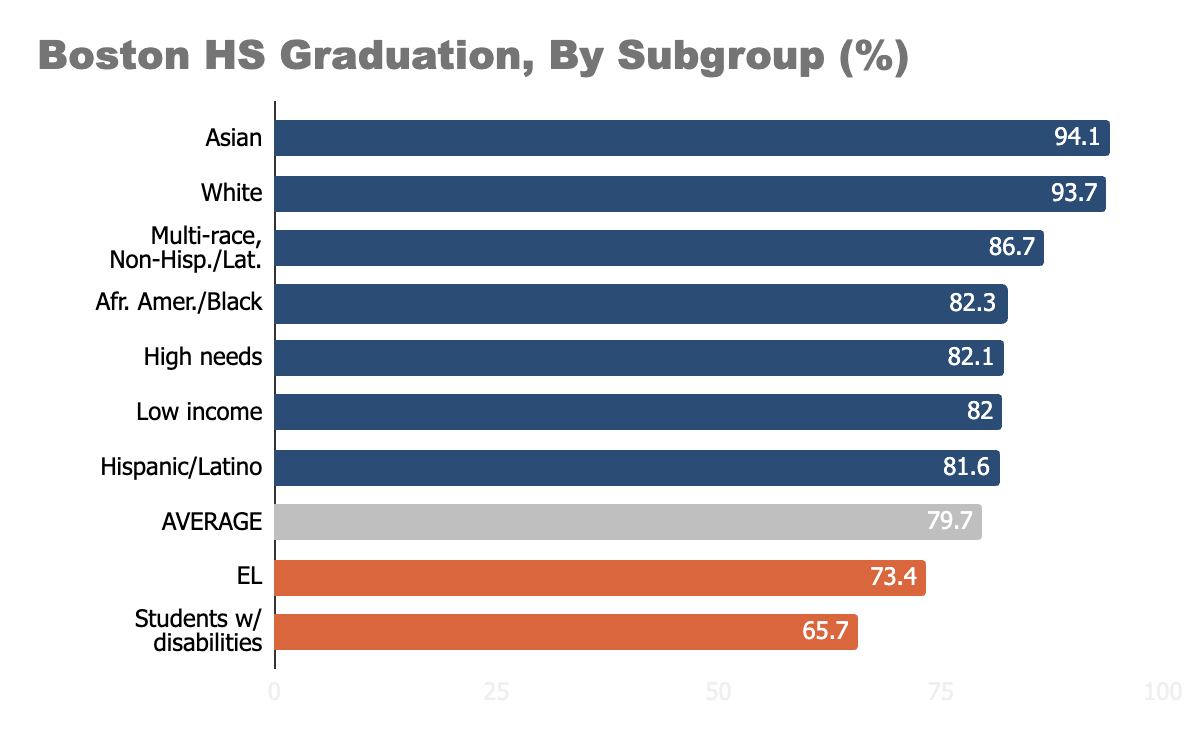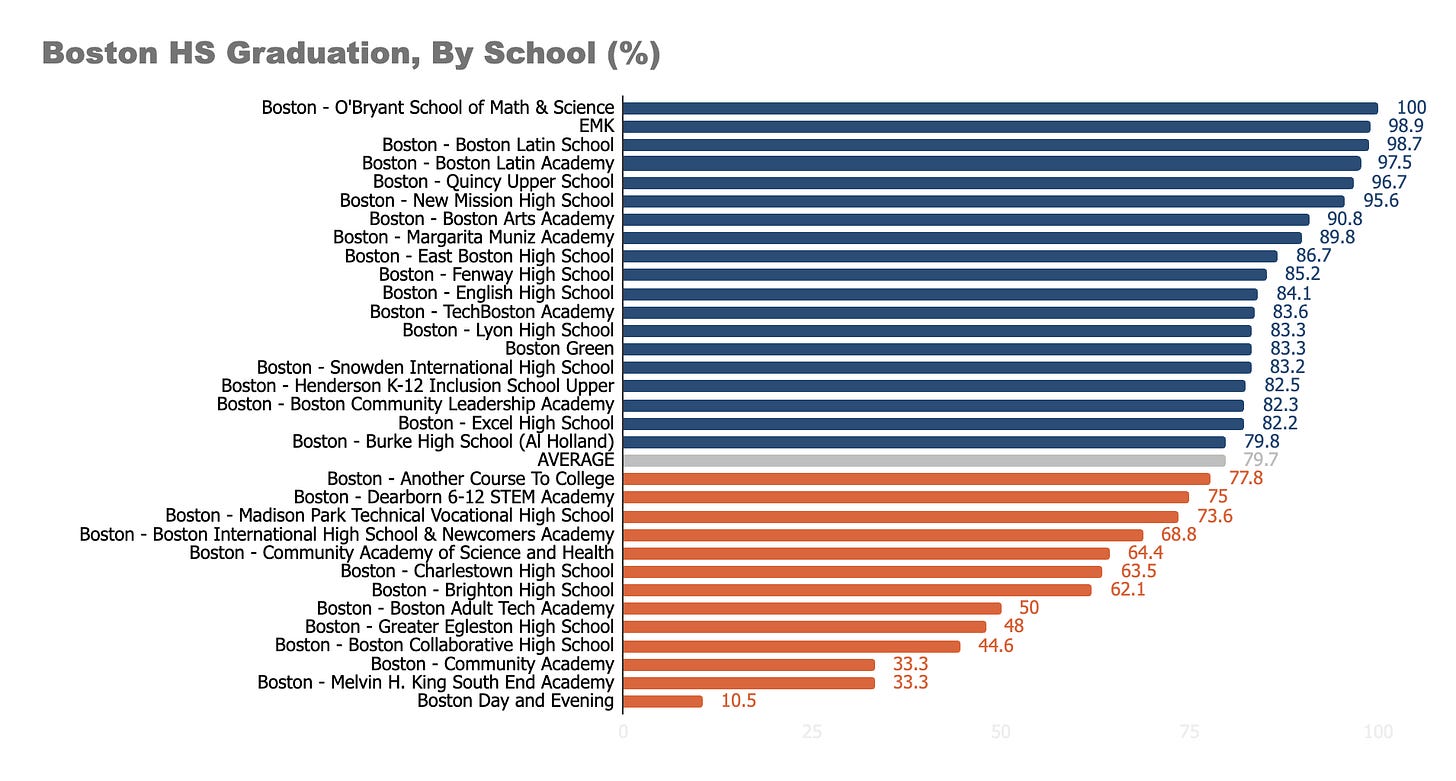According to data released last night, high school graduation rates have declined in Boston and Massachusetts for the second straight year.
Over the long term, graduation rates in Boston have risen (see page 5). However, due shrinking enrollment in the city, Boston actually graduated fewer students in 2024 than the last year before the pandemic.
Gaps remain, by race and other socioeconomic factors.
It is worth noting that this represents progress. Gaps have narrowed, and the majority of historically marginalized students are graduating at rates above the average. Boston’s low income students are graduating at a significantly increased rate (+12% in the last decade), even surpassing the Massachusetts average (81.4%). Although still troublingly low, Boston’s special education students have increased their graduation rates by nearly 15 points.
Gaps remain, also, by school type.
First, school size creates a skew. Four big schools with high rates graduated nearly one-third of all Boston students this past year.
All but one of Boston’s selective and autonomous high schools beat the district average, with comprehensive high schools (e.g., Brighton, Charlestown) and specialized programs (e.g., Greater Egleston) with lower rates. Close readers will notice that the two Boston high schools slated for closure - Lyon and Excel - posted higher graduation rates than the average.
It matters that English learners (EL) and students with special needs lag behind their peers, and that those students and many at-risk students are oversubscribed in the comprehensive high schools or alternative programs with lower graduation rates. It is unlikely that the data or findings from this 2018 report would look much differently today.
There are many, many examples of comprehensive schools, with large student populations, that don’t follow this trend. A simple sort here makes that clear. East Boston’s EL and special needs graduation rates are 81.4% and 87.9%, respectively. English and Snowden have significantly increased their high-needs graduation rates. And so on.
Until the current task force is complete, Massachusetts has no uniform graduation standard. Because so very, very few Massachusetts students did not graduate because they could not pass the MCAS, the elimination of that requirement should not have that big of an effect on actual graduation rates. Individual districts, like Boston, are now tasked to create their own graduation policies. Rates come now, but their value won’t be clear until lagging indicators like college enrollment, college graduation, and income attainment come many years later.
For nearly two decades, the focus on high school graduation rates has been a central policy lever and political yardstick.
That was a good thing, and continued progress probably requires it.
Schools
The new BPS bus policy rolled out right before vacation may not be legal.
Massachusetts has a new education commissioner: Pedro Martinez, a finalist for Boston superintendent a decade ago and soon-to-be-former superintendent of Chicago. An early consideration for Martinez: what to do about the state’s expiring oversight of Boston?
Another Board of Elementary and Secondary Education meeting was held on Tuesday. Materials here.
A sad tally of Massachusetts learning loss, and a more focused report on math achievement and gaps. As concerned as school leaders are, students and families are even more so, according to a new poll commissioned by the Barr Foundation.
With a departing leader and political headwinds, what is the future for METCO?
MA budget season is in full swing. There is a lot more revenue coming in than expected from the millionaire’s tax, but that doesn’t seem to be solving local budget problems. With even wealthy towns make school budget cuts or hike taxes, it is reported that “overrides” votes (to increase tax by greater than 2.5%) are on-track to double this year.
Decision in June, but the Supreme Court appeared to affirm the constitutionality of religious charter schools during oral arguments this week.
The terms “Harvard” and “Donald Trump” have created an infinite loop of internet clicks. Harvard sues. Economic impacts are projected. Professors pitch in. Reports are released.
Most international students got their visas back.
Urban school buildings have been closed and converted into housing before. Closing private colleges may be next.
Other Matters
There is a GoFundMe page set up for the family of Lens Joseph, the little boy who was killed getting off a school bus in Hyde Park earlier this week. No words are suitable condolences for his family and his peers and teachers at UP Academy.












Agreed. Here is a Globe story on some of our work there.https://www.bostonglobe.com/2022/12/01/metro/once-underperforming-east-boston-high-school-made-gains-through-pandemic-can-bps-replicate-success/
East Boston High should be studied for best practices. Open enrollment school in a unique geographic bubble.